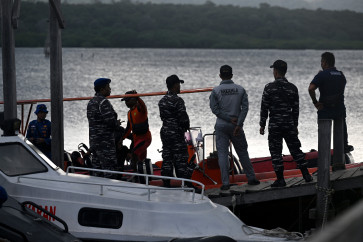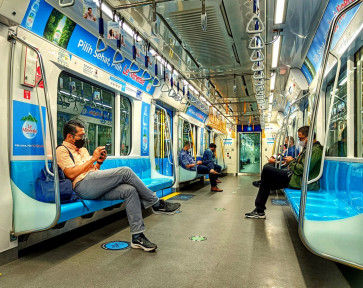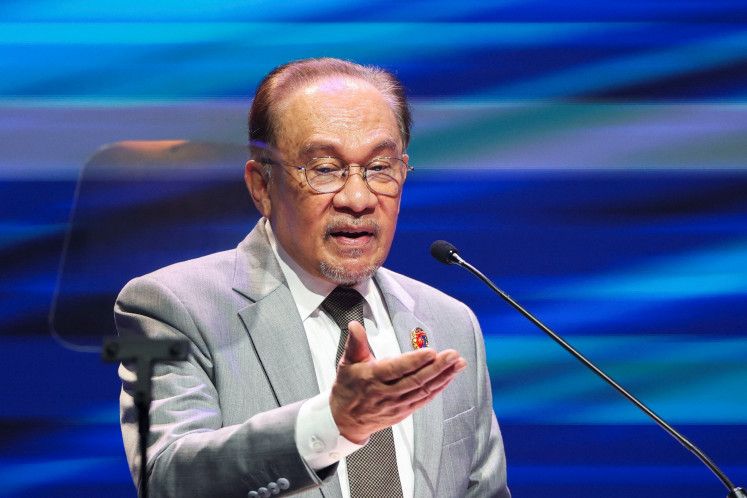Popular Reads
Top Results
Can't find what you're looking for?
View all search resultsPopular Reads
Top Results
Can't find what you're looking for?
View all search resultsDoes Jakarta have too many cabs?
Hailing a taxi in Jakarta has never been a problem because one can be found at almost at every turn, from small alleys in slums to taxi ranks at Jakarta’s plushest malls
Change text size
Gift Premium Articles
to Anyone
H
ailing a taxi in Jakarta has never been a problem because one can be found at almost at every turn, from small alleys in slums to taxi ranks at Jakarta’s plushest malls.
There are so many taxis in the city that the Organization of Land Transportation Owners (Organda) has raised the red flag.
According to Jakarta Organda head Sudirman, there are officially 24,000 taxis licensed to operate in Jakarta, dispatched by 44 companies including Blue Bird, Express Taxi, Taxiku, Primajasa and TransCab.
“However, some 16,000 taxis are licensed to operate in Greater Jakarta outside the city limits but are free to enter the city on a daily basis,” he said.
Waiting: Idle taxis wait for passengers at Gambir Train Station in Central Jakarta. The Jakarta branch of the Organization of Land Transportation Owners (Organda) says there are already too many taxis operating on the streets of Jakarta, leading to unfair competition among taxi companies. JP/Nurhayati
The city transportation authority, however, said that Jakarta still needed more taxis.
“We have set a ceiling of 27,000 taxis so the current figure is still lower than expected,” said City Transportation Agency chief Udar Pristono.
Pristono said the 16,000 taxis from Jakarta’s outskirts entered the city only to drop off passengers and pick up passengers on their way home.
“None of them actually transport passengers between places inside Jakarta,” he said.
Others, however, claim that this is not the case.
“Their pools may be on the outskirts, but many of the taxi drivers look for passengers at public places in Jakarta all day long,” Sudirman said, adding that Gambir Train Station in Central Jakarta was a favorite place of out-of-town taxi drivers to wait for passengers.
Jakarta Transportation Council chairman Azas Tigor Nainggolan said the taxi business in the city was a mess.
“To deal with this problem, we need to implement an integrated regulation encompassing cities in Greater Jakarta to effectively manage the taxi business in the metropolitan,” Azas said.
Taxi drivers have complained that too much competition leaves them with less and less money to take home.
“I used to be able to make Rp 150,000 [US$16.65] per day. Now, I go home with only Rp 100,000 on a good day and Rp 50,000 on a slow day,” said an Express Taxi driver who wished to remain anonymous.
Tarsim, a 58-year-old Taxiku driver, said he suffered more.
“Once, I went home with only Rp 10,000. Another time I got so little money from passengers that I went home with nothing,” he told the Post.
With competition getting stiffer, tempers easily flare between drivers. Tarsim had one such experience when one driver from a rival company pulled over at the same time as him for a would-be passenger.
“She decided to just blow us off and find another taxi. Maybe she just didn’t want us to fight over her,” Tarsim said.
Passengers have also complained about poor service from taxi firms.
Jatinegara resident Yudo Bayu said that he often saw taxis that were far from roadworthy.
“Sometimes riding in a taxi is no different from riding in a public minivan, only the price is much higher,” he said.
Ratna Dewi, who lives in Karet, South Jakarta, said she often had to deal with annoying taxi drivers.
“Some of them are so stubborn. When I give them directions, they ignore me, and then when they end up in the wrong place, they get mad at me,” she said.
Ratna also said that the large number of taxis in Jakarta had contributed to traffic congestion in the capital.
The warning, however, will likely fall on deaf ears.
The city’s largest taxi company, the Blue Bird Group, plans to add another 3,000 taxis to its fleet by mid-next year.
“The demand for taxis in Jakarta is still huge. As long as the demand is there, we will keep adding more taxis,” said the company’s vice president for business development, Noni Purnomo. (mim)










